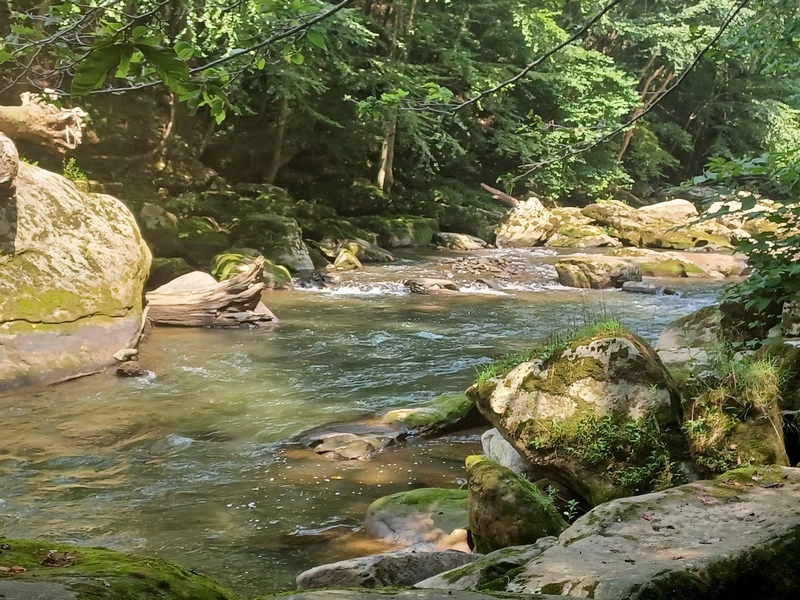Evan Jackson
Bio
Hi! I am Evan Jackson, a sophomore computer science major at IU. I was born and raised in Pittsburgh, Pennsylvania. I took this class because I enjoy learning about how racism and other societal factors led to the social, economic, and political dynamics that exist today. I came into this class knowing little about the relationship between water and African-American communities, but I now have a much better understanding of the causes and consequences of water crises in black communities. It is a pressing issue I am glad to be aware of, and I absolutely intend to continue learning about it.
Project Summary
This project is an online, interactive adaptation of the poster that was made for the First Thursdays Festival. It involves a text box where people can say what water means to them in a few words. Responses will be visualized using a word cloud on a separate page. There will also be two pages where I talk briefly about why water is an important social issue and why I chose this project in order to provide context.
The technology I used to accomplish this was Omeka to make the web pages and Qualtrics to record responses and display the visualization. I decided to limit response lengths and use a word cloud because I wanted the audience to be able to see at a glance what others were saying. Word clouds allow you to quickly and effectively view a variety of responses while also seeing which ones are more common. I thought this would be an effective way to engage individuals who don’t think about water often, as the result is a visualization that is thought-provoking without being overwhelming. My methodology for getting responses was to invite members of the class fill it out and also to send the website to friends, family, and group chats that I am a part of. However, while I wanted to have a few responses to make a solid word map for outside visitors to the site, the point of the project isn’t so much about the responses (in terms of analyzing trends among responses) as it is about interaction and the opportunity for the audience to see the views of others and begin thinking about water as a social issue.
The anticipated audience is anyone early teens and older (with access to the internet, of course), especially those who are unaware that water is a social issue. Those are the people to whom I think the project will be most accessible and most interesting, as it is about sparking thought and getting people to recognize experiences with water that differ from their own. That said, I don’t think the project is outright inaccessible to younger kids, but it wasn’t specifically designed with them in mind, and I don’t really attempt to make the subject more digestible for a young audience beyond the inclusion of the word cloud. I also think that the project is still engaging for those who are already familiar with the water crises throughout America, as they may enjoy sharing their unique perspectives.
Personal Relationship to Water
Growing up, I thankfully always had access to clean water for drinking and sanitation. I also frequently interacted with water for recreation through activities such as swimming, playing with water guns, and kayaking. As a whole, I would describe my relationship with water as relatively close. It was never an integral part of my identity or upbringing, but I enjoy being in and around it, and I suppose I find myself drawn to it to some extent. I chose this picture I took at McConnell's Mills State Park in Pennsylvania to represent water and my relationship with it. To me it represents beauty and life while also serving as reminder of my own fond memories and experiences with water.
Pumzi
The first time I watched Pumzi, it didn’t hit me that hard. It definitely made me think about the value of water in a different way, but I couldn’t help but feel that the reality it portrayed was unlikely to occur in reality. My second viewing, with a heightened understanding of the reality of water stability in America, was much more interesting. What struck me most was the power dynamic that resulted from water being a limited resource. In the film, water acts as a currency and a means of control. Water is rationed to citizens based on the work they do, creating a sort of class system. Also, the council tries to prevent Asha from leaving and finding water outside, presumably so they can maintain control over the people through their control of the water. Given the state of our society, I absolutely believe that a post-water war America would take on a similar structure, with the scarce resource being used as a tool to seize power. Another thing that stuck out to me when watching Pumzi for a second time was the ending. Asha walks through a barren desert in search of life, but collapses only a few miles from a massive forest. For me, this scene represented two ideas. One is the resiliency of nature. The forest signifies that, no matter how bad humans mess things up, both for ourselves and the other life currently on this planet, nature will recover and new life will emerge. The other idea is that we cannot make it alone. If Asha had the support of the society, they almost certainly would have been able to make it to the forest. To me, that shows that if we as humans hope to push past water shortages, climate change, and all the other problems we face, we will have to do it together. The concerted efforts of a few individuals is simply not enough. Pumzi serves as a poignant warning of where we may be headed if things don't change.
What Does Water Mean to You? by Evan Jackson is licensed under CC BY-NC 4.0



